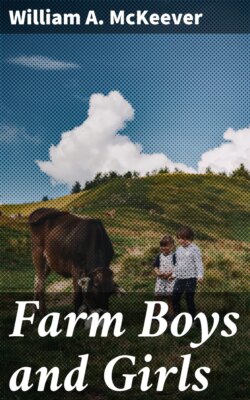Читать книгу Farm Boys and Girls - William A. McKeever - Страница 17
На сайте Литреса книга снята с продажи.
Poor conditions of women
ОглавлениеThe report of the Country Life Commission makes the following suggestions:—
“The relief to farm women must come through a general elevation of country living. The women must have more help. In particular these matters may be mentioned: Development of a coöperative spirit in the home, simplification of the diet in many cases, the building of convenient and sanitary houses, providing running water in the house and also more mechanical help, good and convenient gardens, a less exclusive ideal of money getting on the part of the farmer, providing better means of communication, as telephones, roads, and reading circles, and developing of women’s organizations. These and other agencies should relieve the woman of many of her manual burdens on the one hand and interest her in outside activities on the other. The farm woman should have sufficient free time and strength so that she may serve the community by participating in its vital affairs.”
Plate IV.
Fig. 4.—A day nursery at the Country Social Center. It may be otherwise called “an institution designed to lengthen the lives of tired country mothers.”
In discussing this same matter, Henry Wallace, a member of the Commission, says in his paper, Wallaces’ Farmer:—
“They have been saying that the mother is the hardest worked member of the family, which is often and we believe generally true. They have been saying that in the anxiety of the farmer to get more land, he not only works himself too hard, but his wife too hard, and the boys and girls so hard that the boys get disgusted and leave the farm, and the girls marry town fellows and go to town.
“Now the farmer’s wife is really the most important and essential person on the farm. As such she needs the most care and consideration. You are careful, very careful, not to over-work your horses. How much more careful you should be not to over-work the mother of your children. You rein back the free member of the team. You take special care of the brood mare, and the cow that gives three hundred pounds of butter. Have you always kept the freest of all workers, your wife, from doing too much? How about this?”
